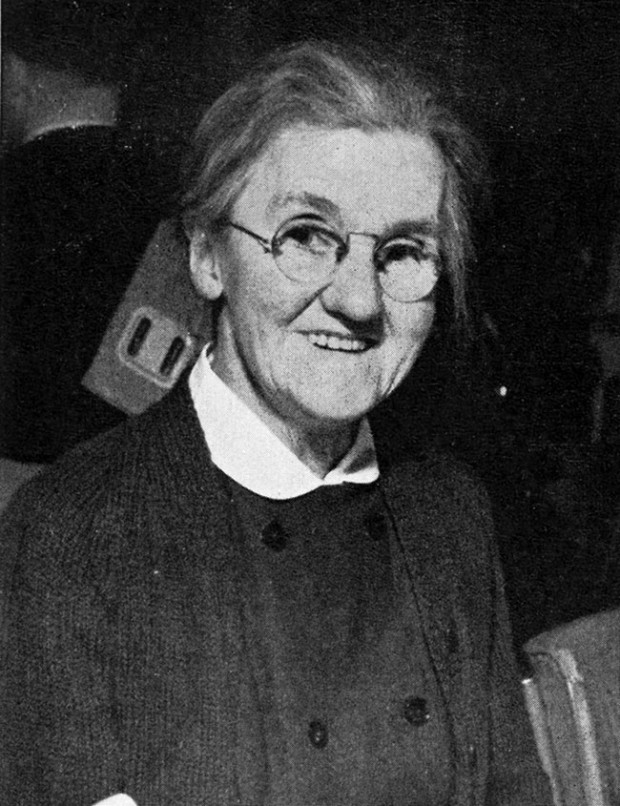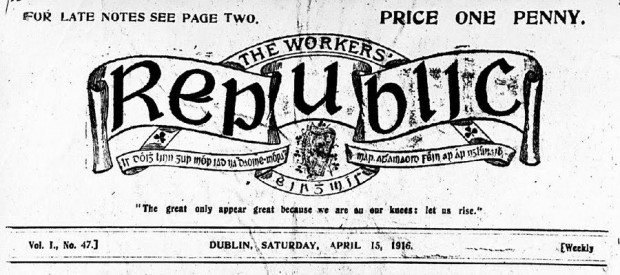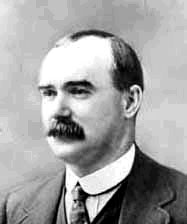4 July 2016
On This Day, 1976 – Rosie Hackett dies (Obituary by Máire Comerford)
Rosie Hackett (1892 - 4 July 1976)

ROSIE HACKETT is dead, the last or one of the last of the team under James Connolly who made Liberty Hall a garrisoned fortress in the last few weeks before the Rising at Easter 1916.
Many who did not know her may remember the small woman behind the counter in the Irish Transport & General Workers’ Union shop on Eden Quay before the old Liberty Hall was demolished and the new one erected. She sold the The Workers’ Republic there.

Connolly’s office was behind the shop and there were three ways of getting there. Rosie was the sentry on the way in from the street who knew whom to expect.
She was there as usual the day the police swooped. They had taken up the papers and Rosie described the scene afterwards when Connolly appeared, armed, in the back of the shop. “Drop those papers or I drop you,” he said. Helena Molony, manager of the paper, was with him; Constance Markievicz was suddenly at the street door. The police retreated. The dockers were mobilised and dropped whatever work they were at as they responded instantly to the call. From then on, Liberty Hall was never left unguarded.

The paper was printed at the rear of the shop. On Easter Sunday, the printing was transferred to a room next door to the concert hall. As usual during the concert, Connolly sat in the middle of the front row. Maeve Kavanagh played the accompaniments on the piano louder than usual, and Rosie sold cigarettes and sweets. During this time the printing was going on behind the door where her table was. There were no quiet moments that could be avoided in the concert. Rosie carried whatever messages there were between the printers and Connolly. When all was over and the audience gone, Rosie recalled for me that those left in the room shook hands with one another.
The Proclamation was printed in two halves. Liberty Hall was not defended in the Rising. The soldiers got in, they printed off some half-copies from the type still on the machine, then they broke it up and scattered it around. Rosie was with the Citizen Army garrison of the College of Surgeons. Then a prisoner at the top of B-Wing, Kilmainham Gaol, for 11 days, she heard the volleys which killed the leaders of the Rising.
She was with Helena Molony early in 1917, after the first releases of prisoners, when the type of the Proclamation was gathered up for a reprinting of the Proclamation in duplicate for the first commemoration of 1916. Paddy Morrin, a steeplejack from Derry, came from Glasgow to scale the ruin of the GPO and raise the Tricolour there at Easter 1917.
Rosie’s first employment was in Jacob’s, and she was the first to join the union. She was among the workers locked out in 1913. Delia Larkin started a workroom for some of the girls but it failed. Then Connolly formed them into a co-op, with headquarters in the shop. This premises too was wrecked and Major de Courcey Wheeler, one of the principal British officers, stole a sewing machine.
He returned this 50 years later at the 1966 commemorations but not to the owners. Suitable or unsuitable speeches – depending on how you look on robbery under arms – were made by ministers. However that may be, the workroom was given more machines by people like George Bernard Shaw. It made the flags which were raised all over Ireland in the revolutionary years after the Rising.
I once asked Rosie: “What was Connolly like?”
“He was medium size, more black than brown. We called him our father. The girls would ask, ‘Is Pa around?’” Rosie replied.
● This appreciation first appeared in An Phoblacht on 16 July 1976
Follow us on Facebook
An Phoblacht on Twitter
Uncomfortable Conversations

An initiative for dialogue
for reconciliation
— — — — — — —
Contributions from key figures in the churches, academia and wider civic society as well as senior republican figures




